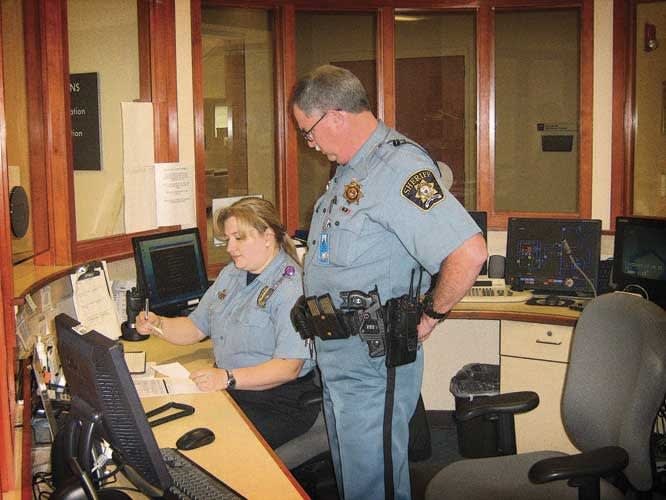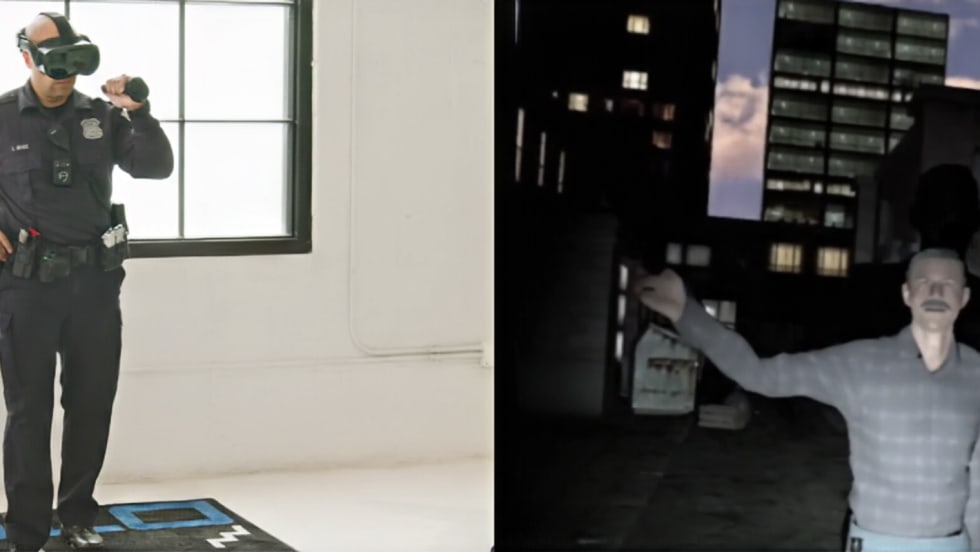Inmates at Douglas County Detention Center in Colorado are indeed being punished, but the deputies who work there don't style themselves as punishers. Rather, they work as enforcers and facilitators-maintaining order and teaching life skills that will hopefully reduce the number of "repeat customers" to the jail.
Inmates at Douglas County Detention Center in Colorado are indeed being punished, but the deputies who work there don't style themselves as punishers. Rather, they work as enforcers and facilitators-maintaining order and teaching life skills that will hopefully reduce the number of "repeat customers" to the jail.
The newest program to take root there is Character First, a leadership training program developed by the non-profit Character Training Institute, located in Oklahoma City. The personal-integrity-based program introduces one ethics-related word per month-words like "endurance," "benevolence," and "truthfulness"-and has been adapted for law enforcement. Introduced into several jails and detention facilities in Oklahoma, Florida, New Mexico, and Colorado, it has reportedly resulted in a significant reduction in behavioral problems among inmate populations.
The corporate and educational versions are in use around the world, including nations in the Near East, Asia, Latin America, and Australasia, as well as in Canada and Mexico. Sheriff David A. Weaver instituted the character-building program for all deputies first, then decided to expand it into the jail population.
"It all boils down to respect-for themselves, their families, and with us," says Dep. Frank Alston, who moderates the classes for male inmates. "They feel they're being respected, so they have more respect for the staff, themselves, and other inmates."
A class on "gratefulness," for example, might include a short video, followed by guided discussions-sometimes led by inmates themselves-during which participants talk about their own challenges to attaining a state of thankfulness. Participants leave with a postcard that they can send to loved ones to express their gratefulness, if they so choose.
"With some of the inmates, sometimes it's hard to interact because there's that 'trust' issue between us," admits Alston, a retired career Marine who himself grew up in an institutional setting: an orphanage in Virginia. "I pick an inmate to teach and facilitate rather than preach. The inmates end up helping each other."
The results, he says, have been fewer disciplinary write-ups, fewer disgruntled inmate "kites," less stressful interactions with family members at visitation, fewer racially charged fights, and more harmonious inmate-to-deputy (and even inmate-to-inmate) communications.
Douglas County Detention Center houses minimum, medium, and maximum-security inmates, with an average population of 349 prisoners daily. It is predominantly a pre-trial confinement facility, with pod-style housing units overseen by teams of four correctional officers at a time, but also houses inmates serving county sentences.
Those who have already gone through the prison system or are en route back to the pen can be the most powerful teachers, Alston says.
"They say (to other inmates), 'You want to pay attention to this stuff. You don't realize how good you have it here, and you don't want to end up in DOC."
The Douglas County jail provides a variety of opportunities for inmates to get their lives back on track, via Alcoholics Anonymous, Narcotics Anonymous, literacy classes, and a GED program, as well as anger-management classes and mental-health referrals. The offerings are also behavior-management tools-positive activities that keep inmates from sitting around and preying on each other, vandalizing the facility, or otherwise causing problems.
"Punishment is not our role. That is the role of the courts," says jail commander Capt. Robert McMahan. "As a management tool, we have to be cognizant of what fills jails up. Your average daily population will continue to grow if you don't help them address issues (that brought them into the corrections system to begin with).
"It's a responsibility to the community," he adds. "In the sense of public safety, and in managing a budget and resources, (we need) to help people be successful when they leave here."
The Douglas County Sheriff's Office fields a force of 286 sworn deputies, with 105 assigned to the detention division. In the mid-1800s, the area was a wild frontier, filled with Indian raids, gunplay, and spontaneous vigilante posse hangings. Today, busy metropolitan Denver pushes ever outward toward the county land.
If the character-building program sounds vaguely like a community policing project, that's because jails have long had to employ strategies that promote appropriate community interaction among their "neighborhoods" of inmate housing units, McMahan says.
"You're trying to police a community filled with criminals, and it is the officers' responsibility in the housing unit to manage those problems," he says. "It could be as simple as what channel is going to be on the TV, or there could be racial tensions. Nobody can escape it, and you have to manage that whole population."
McMahan, who entered law enforcement 21 years ago, is Douglas County's first jail manager certified through the American Jail Association. He says he looks for people who want to forge a career in corrections work, and invests in them with additional training and educational opportunities.
"Oftentimes in sheriff's offices, people don't want to work in the jail, and only use it as a stepping stone to go into patrol," he notes. "My management philosophy is to develop professionals to work in the jail, rather than people just passing through."
And there are victories.
"The most satisfying thing is when you actually get someone turned around and they leave here with a changed attitude," McMahan says. "They thank you and are excited to go out and try to be successful rather than return to their old habits."
While ethics-based programs like Character First seem to have improved day-to-day life for inmates housed in the jail, McMahan says they have also resulted in a more pleasant environment for visitors, and for deputies who work there.
"This is a critical tool for community safety, because locking people up is just a start of the criminal process," he says. "As professional law enforcement, we have to do the best we can to prepare them to go back into society. Because they will be going back into society."
Bryn Bailer, a former newspaper reporter, is a member of the Tucson (Ariz.) Police Department's Communications Division.











